七年级英语(2014.6定稿)
人教新目标2014新版七年级英语下册教案整册免费

人教新目标版2014—2014年度下学期七年级英语教学案授课教师__________2014年月日Unit 1 Can you play the guitar?一. Knowledge and abilities goals:1.vocabulary:dance,swim,sing,play chess , paint ,speak English, play the guitar2. How to use Model verb‖ can‖.3. Listening and speaking skills and communicative competence.二. Teaching method: Listening and speaking methods. Pair works.三. Moral goals: Encourage students to express their abilities.Content of courses: In this period, students will learn some names of clubs ,such as art , music, chess club, swimming club, etc. students will learn the drills :Do you want to join…club ?Can you …?四. Importance and difficulty: canTeaching Aids: A tape recorder. Some pictures. A projector Some sports things, such as volleyball, basketball, etc. Preparation test paper for lessons before class.五. Teaching Time: 4 periodsPeriod 1 (Section A: 1a-2d)1.Knowledge Objects: Learn to talk about abilities.Know something about the culture of clubs. Can you/he..?What can you do? What club do you want to join?can, can‘t, draw, dance, swim, speak, walk.2.Teaching key point: can3. Teaching Difficult point: can4.Teaching Procedures:Step 1. Lead-inEnjoy a song I’m a musicianT: Do you want to be a musician? S:T: Can you play the piano? S…T: What can you do? S: I can…T: What about you? S:T: OK, now please show your talent and tell us what you can do.Ask one of the students come to the front and do the action. Ask other students to guess what he or she can do.Step 2. PresentationT: Look at the pictures. What are they doing? S:Step 3 Pair workLook at the pictures. Ask and answer like this:A: Can you play basketball?B: Yes, I can. / No, I can‘t.Can you…?Step 4 PresentationShow some pictures of fam ous stars. Practice the third person ―he, she, they‖T: Where can you play chess? S:T: Yes, in a chess club. This term, we have a lot of clubs. What club do you want to join? S…T: Sounds great. Can you…?S: Yes, I can/ No, I can‘tIf the answer is negative, guide students to say:S: No, I can‘t. But I can learn it from others.Step5 Pair workA: What club do you want to join?B: I want to join the…A: Can you …?B: Yes, I can . No, I can‘t. But I can learn it from others.Step 6 ListeningListen to 1bListen to 2a and 2b. Tell them to give special attention to listening activity (names of the clubs). Finish the tasks.Step 7 Pair workLook at 2b and talk about what the people can do the clubs they want to join.Step 7 Role-play the conversation 2dT: If you like telling stories. What club can you join?S: Story telling club.T: Right. Please read the conversation following the recording. Who wants to join the story telling club? Then role-play the conversation.Step 8 Explain some language points.Step 9 HomeworkReflection after classPeriod 2 (Section A: 3a-3c)1. Knowledge Objects: go on learning to talk about abilities.—Can you play the guitar? —Yes, I can./ No, I can't.—What can you do? —I can dance.—What club do you want to join? —I want to join the chess club.2. Teaching key points: Conclude the usage of ‗can‘; put all new language into practice through differentactivities.3. Teaching Difficult points: Distinguish ―say, speak, tell, talk‖4.Teaching Procedures:Step1:Greeting, Warming up and duty report.Watch a flash about the content of the Just for fun.Talk something about the flash: Why is the other boy unhappy?Introduce because of the difference of time zones, the time in different places are different.Revision: show the time in six places: Beijing, Tokyo, Paris, Los Angeles, New York, and London. Elicit the sentence pattern: What time is it?It‘s……Draw attention to the ―am‖ and ―pm‖. For instance, Beijing is seven o‘clock in the morning. We can say Beijing is seven am. Los Angeles is three in the afternoon. So we can say Los Angeles is three pm. (teacher helps students answer).Step2:Review the words learnt in the last period and add more.(1)T:Here are some Chinese, let us see w hat time do they usually get up/ take a shower…get up take a shower eat breakfast go to school eat lunch run go homedo homework eat dinner go to bed(2)ask students to make a surveyAsk your friend 5 questions about his /her day. Then make a report.A: What time do you usually…?B: I usually…at…Step3:presentation.(1)Ben‘s day. Introduce something about Ben.Using the sentence pattern: What time does he usually get up/go to school/…Pay attention to the verb form of the third person.Discuss Do you like ben‘;s routines.(2)Show the picture of Scott. He usually gets up at 5 pm.Ask students to predict what his job is?(3)listen to the tape,and try to answer this question. then read through the passage,and match the pictures with the times.(4)read it again and fill in the chart.(5)answer the following questions1.Where does he work?2.How does he go to work?Step4:Work on 3a.(1)Read through the passage and tell me what his job is.(2)Read it again and match the pictures.(3)Answer questions:What does he do after he get up?Does he go to work after breakfast? What does he do?How does he go to work? By bus or on foot?What does he do before he goes to bed?What does―What a funny time to eat breakfast!‖mean?Step5:Follow up.T:My friend Da Bao likes Scott's work, so he gets to Sai Te Hotel . But he doesn't find him.T: There are many children in the hotel. Look, they are coming. Please ask them questions to find the real Scott.Step6:Work on part4.T:Now six people make a group, and ask the other students when they usually go to bed . The leader lines up from the earliest to the latest bedtime.T: Let's listen Group1…Group2…Step7:Work on part 3 of self –check.T: Now I want to know something about what you do on weekends. You can go, ask your classmates and fill in the forms. Then you have a report.T: You may begin it like this "Ma Li gets up at …"Step8:Homework.Oral work:(1)Read 3a and recite it.(2)Go on making a survey to find out what your classmates do on weekends.Reflection after clasPeriod 3 (Section B: 1a-1f)1. Knowledge Objects: go on learning to talk about abilities. drum, play the drum, piano, play the piano, violin, play the violin2. Teaching key points: Improve listening and speaking3. Teaching Difficult points: Improve listening and speaking4. Teaching Procedures:Step 1 Warming- up and revisionDaily greeting.Check the homework. Let some Ss report what his/her family members can do.Step 2 PresentationPlay the sound of different kinds of instruments. Let Ss guess what it is.Act and show your classmates your talent.T: Please stand in front of your classmates. Act and say what you can.S1: (sing and dance) I can sing and dance.S2: (play the drum) I can play the drum..Step 3 ListeningTell the Ss that they will listen to some sounds of the instruments. Listen and number the words [1-4] in the order of the sounds you hear in 1a.Play the recording again and check the answers.T: Now let's work on 1c. First, let one student read the words and phrases aloud.Then listen to the 1d and circle the words and phrase you hear.Check the answers:T: Now please look at the chart in 1e. What can Bill, Cindy and Frank do? What can't they do? You'll listen to the recording again. Then try to fill in the blanks.Step 4 Group workWork in groups. Take turn to talk about what Bill, Cindy and Frank can and can't do.S1: Bill can play the guitar, but he can't sing.S2: Cindy can sing and play the drum, but he can't play the piano.Teacher can walk around the classroom, and give some help to the Ss.Step 5 HomeworkMake up a conversation between a volunteer and a person who is in charge of a sports club/old people‘s home/music club.Reflection after class:Period 4 (Section B: 2a-self check)1. Knowledge Objects: go on learning to talk about abilities. also, people, help (sb) with sth, center, home, today, be good with, make, make friends, weekend, on weekends/on the weekend, teach, musician2. Teaching key points: Also, too; be good with, help with3. Teaching Difficult points: Describe one‘s ability4. Teaching Procedures:Step 1 Warming-upCheck the homeworkAsk some pairs to show their conversationsStep 2 ReadingFirst, show some pictures of the boys and girls and some key words in 2a.T: Here are some pictures and information about Peter, Alan and Ma Huan. Can you describe them according to the pictures and key words?S1: Guide Ss to use ―also, too‖, and distinguish how to use these two words.Give comments on Ss‘ descriptions.T: Now we‘ll read three ads. What's the main idea of each ad? What's each ad's title? Now let's read the three ads and select a title for each ad. Ss read carefully and try to select a title for each ad. Check the answers with the class.Step 3 Review the usage of “tell”,Review and distinguish the usage and function of ―help‖T: Suppose Peter, Alan and Ma Huan want to help to do something after school. Which ad is right for him/her? Now read the descriptions in 2a and the ads in 2b again. Select a right ad for each person.Ss read the descriptions in 2a and the ads in 2b again. Try to select a right ad for each person. They can talk about the answers in their groups.Check the answers with the class.Step 4 Homework1. Recite 2a and 2b2. Finish the exercise on p6Reflection after class:Unit 2 What time do you go to school?1. Teaching Aims:1) Aims of Basic Knowledge:①V ocabulary: time, shower, usually, O‘clock, what time, go to school, take a shower.② Grammar: What time do you…? What time does he / she…?③ Function: Use the simple tense to talk about the daily life.2) Aims of Abilities: Listening skill. Speaking skill. Reading skill. Writing skill.3) Aims of Emotion: Love life.2. Analysis of the Material:1) Brief Introduction of the teaching material:What time / When do you…?‖ ― What time / When does he…?‖2) Teaching Focus: What time do you…? What time does he/ she…?3) Teaching Difficulties: Present tense.3. Learning Methods: Make a plan. Culture.4. Teaching Methods: Student- centered. Task-based Teaching.5. Teaching Time: 4 periodPeriod 1(Section A: 1a-2a)Step One: Warming-upGreetingT: Good afternoon, everyone.Ss: Good afternoon, Miss Yang.Step Two: Presentation1.Adjust the time, and ask students questions.T: What time is it? Ss: It‘s 12 o‘clock. ( Write on Bb )( Help Ss to say )T: What time is it? Ss: It‘s 10:15.( Help Ss to say )2.Ask one student to come to the front, adjust the time and ask the other students.S1: What time is it? Ss: It‘s 9 o‘clock.3.Teach the new words & phrases.Show some pictures of different clocks and the activities.T: I‘m very busy these days. Can you guess what time I get up / eat breakfast / go to school / run / take a shower? ( Write on Bb)T: I usually get up at 6:35. ( Teach Ss the new word ― usually‖ )S1: You usually eat breakfast at …S2: You usually run at…S3: You usually take a shower at …4.Ask Ss to do the exercise of 1a, and then check the answers.Step Three: Listening1.Show Ss the timetable of Rick‘s ( write on small Bb )Rick‘s timetableGets upEats breakfastRunsGoes to schoolTakes a showerAsk Ss listen to the recorder and fill in the chart.Then check the answers.2.Ask and answer.T: What time does Rick get up / eat breakfast / run / go to school / take a shower ?Ss: He gets up / eats breakfast / runs / goes to school / takes a shower at…( Ask Ss pay attention to the underlined phrases.)Step Four: Consolidation1.Ask Ss to look at the pictures and tell their days.Ex ample: I usually get up at …. I eat breakfast at …. I go to school at …. At …, I take a shower.Step Six: Homework1.Try to remember all the words & phrases.2.Survey: Ask your classmates their routines, and give your report.3.Plan: January 1st is coming. Please plan it, and make your day wonderful.Step Seven Blackboard DesignUnit 2What time do you go to school?What time do you go to school? I usually go to school at six thirty.go to school get dressed get up brush teetheat breakfast take a shower what timeReflection after class:Period 2 (Section A: 2b-Grammar Focus)1. Aims and demands :1) Language skills :Ss learn to talk about kinds of transportation, and how long it takes to go places, andhow far apart places are.2) Target Language : Words : how far , get to , bicycle , subway , bus stop, train station , minute,kilometer, mile , transportation , calendarSentences: How do you get to school ? / How long does it take ? / How far is it ?3) Moral object : Through learning this unit , Ss can enable them to care for each other whenever crossingthe roads and pay attention to the sign of traffic.2. Analysis of the material:Students have learned the transportation before.. In this unit ,they need to learn more details about the transportation. At the same time ,they need to learn ―How long and How far‖ and they can use them freely.3. Teaching methods:pairwork , groupwork ,listening and speaking, practicing4, learning strategies:Personalizing Inferring vocabulary5.Teaching aids:Tape recorder, a projector or a computer6.Teaching period:Four periods.Period 3 (Section B: 3a-3c)1. Aims and Demands: Key vocabulary, How do you get to school ? How does he get to school ?2. Teaching methods : Listening Writing Pairwork3. Teaching Aids : A tape recorder.Step I Leading inT: Good morning, everyone! You know I live far away ,so I go to school by bus every day. What about you? David, ―How often do you go to school?‖S:--------T: So we will talk about how to get to places in this unit.Step IINow I will show you pictures and let‘s review the transportations we know. Then we will learn more about it .(take the subway) Please open your books and finish 1a.Step III1. There are five names in 1b.Now they are in the picture. We should find them.2. Play the tape .They should listen carefully and find the persons .Write the numbers next to the correct students in the picture above. After listening , check the answers together .Step IVPoint to the example in the box , ask two students to read it .then ask them to make up their conversations about how the people in the picture get to school .Teacher choose some pairs to act their conversations.Step VPracticing the listening :T: I will play two conversations The people are talking about how students get to school and how long it takes .The first time check the kinds of transportation that you hear. The second time match the time with the kinds of transportation activity 2a.Step VI1. Pay attention to the picture and dialogue.2. Make your own dialogue into pairs.3. Act it in front of the students.Step VIISummary and homework: This class we have learnt some key vocabulary and the target language .I hope after class you can survey how does your friends get to school .and pre-revise the 3a,3b.Step VIII Blackboard DesignReflection after class:Period 4课题Unit 2 What time do you go to school?(第4课时)教学批注教学设计一、教学三维目标1.知识与技能:(1)通过本单元的学习,使学生掌握相关的时间表达方法以及相关的词汇,能够就生活中的时间安排及日常活动来交谈;(2)通过情景设计来激发学生学习的学习兴趣,并培养学生的自主学习和与他人合作的精神;(3)通过谈论作息时间及日常活动,培养学生合理安排作息时间的意识。
2014人教版七年级下英语Unit6-SectionA课件2
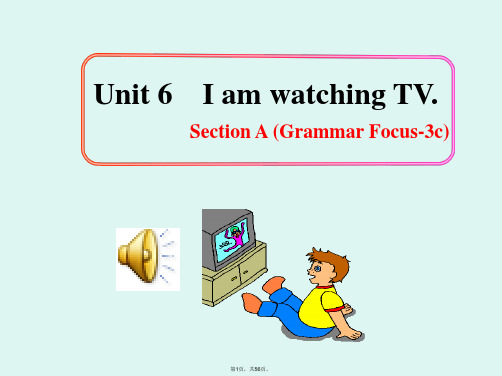
具体的时间点 (如:at six o’clock)
第14页,共56页。
动词现在分词(-ing)形式的构成
一般在动词 原形后+ing
以不发音的e 结尾的,去e, +ing
重读闭音节 以一个辅音 字母结尾的, 双写这一字 母+ing
go ask write take
第30页,共56页。
exercise
A: What are you doing? B: I’m exercising. A: Are you running?
B: No, I’m not. I’m exercising.
第31页,共56页。Biblioteka listen to a CD
What are you doing? I’m listening to a CD. Are you …? Yes ,I am./No, I’m not. I’m …
第26页,共56页。
句型转换 1.I am watching TV.(否定句)
I am not watching TV. 2.She’s opening the box now.(一般疑问 句)
Is she opening the box now?
3.He is doing his homework.(复数句)
dancing
exercising
making soup talking on the phone 第43页,共56页。
Grammar Focus
第4页,共56页。
What is he doing?
He is reading a newspaper?
第5页,共56页。
2014年春季第三次月考七年下英语试题2014.6

2014年春季第三次月考七年下英语试题一、单项选择(40分)( )1. She likes soccer after class.A. played B.playing C.plays D.play ( )2.Cathy of medium build and curly hair . A. has, has B. is ,is C.is,has D.is,have ( )3. I usually _____ one hour ______ soccer with my friends on Sunday afternoon.A. spend, playingB. spend, playC. take, onD. take, to play ( )4.You must remember ______the window before you leave.A. closingB. closeC. to closeD. closes( )5. ---?---He has big eyes and small nose .A.How old is he ?B.What does he look like ?C.What does he do ?D.How is he ? ( )6. It’s a day. Let’s play at home.A. rainy B. sunny C. rain D. snow( )7. There some fish in the bowl and some eggs on the table.A. is B. has C. are D. have ( )8. I’d like some and . A.porridges, vegetable B.juice, tomatoesC. potatos, bananasD. French fries, orange juices( )9 Andrew enjoys ___________ very much.A. play footballB. playing footballC. playing the footballD. to play football( )10. Julie would like TV. A. watch B. watches C. watching D. to watch ( )11.-- of shoes do you wear? ---Size 7.A.WhatB.What sizeC.What kindD.What color ( )12. The _______ noodles are very popular in this city.A. muttons and eggsB. mutton and carrotsC. mutton and carrotD. muttons and carrot ( )13. ---Would you like _____ tea? ---Yes, _____.A. some, pleaseB. any, pleaseC. any, I willD. some, I would ( )14.---What about some fish? --- ___________, I’m full(吃饱了).A. Yes, pleaseB. Yes, I do.C. No, thanksD. I’d love to( )15. What size bowl of dumplings would you like, small, medium ____ large?A. andB. withC. orD. But( ) 16. My homework is difficult. A. little B. a little C. few D. a few( ) 17. ---Lucy practicing playing the piano right now? ---Yes, she .A. Do; doB. Does; doesC. Is; isD. Is; does( ) 18. ---is your vacation? --- Oh, it is great! A. Why B. How C. WhenD. Where ( ) 19. ---What about to the supermarket with me? ---That’s a good idea.A. goingB. to goC. wentD. goes( ) 20. Sarah a funny story now. A. is reading B. looking at C. is read D. are watching ( ) 21. Look! The young man is coming. He a pair of cool sunglasses.A. puts onB. is puting onC. is wearingD. wear ( ) 22. Mr Wang ____in this school.A. don’t teachB. not teachC. doesn’t teachD. doesn’t teaches( ) 23. Do you know ?A. How does your father look likeB. What your father looks likeC. Who does your father look likeD. Where your father looks like( ) 24. I think I know her. She has _____ hair.A. short blonde curlyB. short curly blondeC. blonde short curlyD. curly blonde short ( ) 25. Michel Jackson, the rock(摇滚) singer long curly black hair.A. hasB. haveC. withD. of( ) 26. there on time, he gets up early. A. To get B. Getting to C. Go D. Get ( ) 27. please tell Jim watch too much TV after dinner.A. doesn’tB. don’tC. isn’tD. not to( ) 28.The zoo is this weekend. A. lucky B. busy C. easyD. difficult ( ) 29. Each of us an English name. A. have B. has C. are D. does( ) 30. Molly makes a wish and the candles.A. blows outB. put outC. cuts downD. cuts up( ) 31.There are tomatoes on the table, but there isn’t mutton on it.A. some, someB. some, anyC. any , anyD. any, some.( ) 32. He doesn’t like coffee milk, but he likes coke orange juice.A. and, andB. and , orC. or, andD. or, or( ) 33. There are some differences _______ me _______ my sister.A. from; toB.across; fromC. from; andD.between; and( ) 34. ---Where is Jimmy now?---Oh, I think he _________ his car in the garden.A. washesB. doesn’t washC. is washD. is washing ( ) 35. There are two _________ reading English at the English Corner(英语角).A. studentB. mansC. studentsD. peoples( ) 36. Don’t pay for the coffee. It’s . A. good B. tasty C. boring D. free ( ) 37. --- _______ the banks? ---They are across from the hotel.A. Where isB. Are thereC. Is thereD. Where are( ) 38. ---How can I get to the post office?---Walk this road, turn left the third crossing. It’s the right.A. down; at; onB. on; along; inC. through; in; onD. along; on; at( ) 39. I am not sure. A. always B. still C. never D. yet( ) 40. Mike likes to watch the birds _________ in the sky.A. flys B. flying C. flies D. fly 二、完型填空(10分)People in different 41.____ like to eat different food. 42._______ kind of food do people would like 43.____? For example 44._______, fried potatoes chips are very 45._______ . Sometimes people 46._______ them at home, but they usually go to a fast food restaurant 47._______ them. They can 48._______ them in the restaurant 49._____bring them away at home. Sometimes, they 50.________ like to eat them in the park.( ) 41. A. cities B. countries C. towns D. homes ( ) 42. A. where B. when C. what D. who ( ) 43. A. eat B. to eat C. eating D. eats ( ) 44. A. in a UK B. in an UK C. in the UK D. in UK ( ) 45. A. popular B. large C. small D. cheap ( ) 46. A. cooking B. cooks C. are cooking D. cook( ) 47. A. buy B. buys C. buying D. to buy ( ) 48. A. has B. have C. to have D. having ( ) 49. A. and B. but C. or D. so ( ) 50. A. too B. also C. either D. and三、阅读理解(25分)AI`m Tony. My best friends are Frank and Cindy. We often do many things together. Frank lives next to my home and we are in the same class. He is thirteen years old and tall and medium build. He has curly hair and blue eyes. He is good-looking and clever. He is good at math and often helps me with my homework. He likes wearing black pants and yellow T-shirts. Cindy doesn`t go to my school. She is eleven years old. She is thin and medium height. She has curly blonde hair and her eyes are brown. She is good-looking, too, but a little bit shy. She is good at playing the guitar. Her facorite subject at school is music. She often teaches Frank and me to play the guitar after class.The three of us have great fun together, and we help each other and sometimes play video games at my house.( )51. eyes are blue. A.Frank’s B.Cindy’s C.My D.Tony’s( )52. good at math .A.Cindy is B.Tony is C.Frank is D.I am( )53. is good-looking ,but a little bit shy .A.Frank B.CindyC.TonyD.My friend ( )54.Where do they play video games ?A.at schoolB.at Frank’s houseC.at Cindy’s houseD.at Tony’s house( )55.What things do the three children do together ? They .A.play baseballB.play video gamesC.play the guitarD.both B&CBYou’re welcome, ladies and gentlemen. Everything in our restaurant is cheap and delicious.Let’s have a look. For breakfast, you can eat porridge, eggs and noodles. For lunch and dinner, you can have rice, dumplings, different kinds of meat and vegetables. There are also some drinks for you. Come and have a meal, please. It’s a good place to enjoy yourself. breakfast: porridge($1.00), egg($1.00), noodles($2.50-$5.00).lunch and dinner: rice ($1.00), dumplings ($5.00), cabbage ($6.00), carrots ($8.00),potatoes($8.00), chicken ($12.00), fish ($15.00), mutton ($18.00);green tea ($2.00), iced tea ($3.00), orange juice ($4.00).business hours: Mon.-Fri. 6:30 a.m.-9.30 p.m. ; sat.-sun. 7:00 a.m.-10.00 p.m..( )56. What can you eat for breakfast in the restaurant _________.A. dumplings.B. beef noodles.C. ice cream.D. french fries. ( ) 57. You can have a meal in the restaurant ________.A. at 6:40 on Saturday morningB. at 9:45 every eveningC. at 11:30 every morningD. at 11:30 on Sunday night( ) 58. If you have rice, cabbage, and green tea for lunch, you need to pay ___________.A. $ 8B. $9C. $10D. $11( ) 59. Mr black goes to the restaurant with $ 22 for dinner. He can order rice, potatoes,chicken and ____.A. iced tea B. orange juice C. green tea D. an egg( ) 60. What does the speaker probably(可能) do ?A. a reporter.B. an artist.C. a waiter.D. an actor.CMy sister Sharon and I look very different. She’s tall, and I’m short. She has short curly dark (黑暗的,深色的) hair, and I have long straight blond hair. We both have dark eyes, but Sharon wears glasses, and I don’t. And she always wears large earrings (耳环). I don’t wear earring.Sharon and I do many things together (一起). We watch movies together, and we often go shopping. We play tennis together every Saturday. Often, people don’t know that Sharon and I are sisters, because we look so different. But we are also good friends.( ) 61. What does Sharon look like? She .A. is tall and has dark hairB. doesn’t wear earringsC. has long straight blond hairD. is short and dark hair( ) 62. The sisters don’t together.A. play the pianoB. play tennisC. go shoppingD. watch movies( ) 63. The two sisters both_ .A. wear glassesB. have blond hairC. like earringsD. have dark eyes( ) 64. What does the word “different” mean in Chinese?A.一样的B. 困难的C. 不一样的D. 友善的( ) 65. Which is the best title (标题) for this reading?A. Playing TennisB. My Hobbies.C. Two sistersD. Meeting New FiendsDIt’s Sunday morning. There are many people in the park, some boys are playing basketball. There are some girls under a big tree. They’re singing and dancing. What are those women doing? They are drinking tea. Look at the woman in a blue coa t. Who’s she? She’s my mother. She is talking to Edward. Edward is her student. He is a good student. He studies hard. He’s go od at all the subjects. And he’s friendly to all his teachers and his friends.( )66. The boys are ______.A. singing B. playing basketball C. dancing D. drinking ( )67. My mother is ______. A. a teacher B. an office C. a doctor D. a woman( )68. Edward is in ______.A. his home B. the restaurant C. the zoo D. the park( )69. Who’s under a big tree?A. Some people.B. Some women.C. Some girls.D. Some boys.( )70.What col or is my mother’s coat? It’s ______.A. blue B. white C. red D. yellowEThe final exam comes with June. When the exam ends(结束), the summer vacation begins. Boys and girls have about two months to relax. The summer vacation is the best time of the year for most children. The weather is usually fine. They can swim, go to summer camp or visit other places with their parents.Of course, the beaches are good places for relaxing. Some children are lucky to live near the beach. They can play in the water. But for the children far from the sea, they go to thebeaches for one or two weeks with their parents.Why do children like spending their summer vacation on the beaches? It is because they like the sand(沙), the sun, the cool wind and the sea water. There are lots of new things to see, nice things to eat, and exciting things to do.( )71. School children usually have exams _____.A. in JuneB. after JuneC. before JuneD. in July( )72. The summer vacation is about ______.A. two weeksB. two monthsC. three monthsD. two days( )73. Why do children like summer vacation?A. because the weather is fine.B. because it is long.C. because the weather is fine and they can have lots of activities(活动).D. because they can have exams.( )74. Children far from the beach can enjoy the sea ______.A. in the eveningB. very oftenC. for two monthsD. for one or two weeks ( )75. Which of the following is not right?A.Children like going to the beaches only because they can see lots of new things.B. Children like summer vacation best.C. Children can swim and enjoy the sand, wind, and water on the beaches.D. Children like to spend their summer vacations on beaches.四、综合语言知识(选出可以替换划线部分且意思一致的一项,共5分)( )76. Why don’t you come and have a look?A. Why don’tB. Why notC. Why aboutD.What don’t( )77. I spent five yuan on this pen. = I spent five yuan buying this pen.A. byB. inC. forD.on( )78. He is of medium build.A. not tall or shortB. thin or heavyC. of medium heightD.not thin or heavy ( )79. We often take a taxi to go there.A. go there by taxiB. by taxi to thereC. take taxi go thereD. go there to take a taxi ( )80. There isn’t any water in the bottle. A. is not B. is never C. is no D.is any五、完成句子(每空一词,每词一分,共12分)81. There are three ______________ (特色菜) for today.82. Turn left at the first_____(十字路口) and you can see a______(餐馆) on your____(右边) .83. Eason Chan is a ___________ (受欢迎的) __________ (歌手) in our country.84. His sister is of medium ___________ (身高) and has ___________ (直的) hair.85. There is a _________ (图书馆) in our school.86. Can you ___________ (描写) your friend for me?87. The birthday foods bring good ___________ (运气) to the birthday ___________ (人).七、书面表达(10分)写一篇英语作文介绍一位好友。
2014年新目标新人教版《Unit6-I'm-watching-TV.》七年级英语下册课件

2.如果动词是以不发音的字母“e”结尾,要去掉 “e“,
再加 ing。
Eg : write—writing take—taking have—having
3.以一个辅音字母结尾的重读闭音节,要双写末尾的辅音字母,再 加上 ing。
第17页,共49页。
What are they doing?
They are fighting.
第18页,共49页。
What are they doing?
They are talking on the phone.
第19页,共49页。
What are they doing?
They are ….
watch TV 看电视
clean 打扫
read a newspaper 看报纸
talk on the phone 电话交谈
listen to a CD 听CD
use the computer 用电脑
make soup 做汤
wash the dishes 洗餐具
exercise 锻炼
sing
唱歌
make soup 做汤
第28页,共49页。
第29页,共49页。
1b
Listen. What are these people doing? Write numbers from 1a.
a.Jenny __1_b. John ___8c.Dave and Mary ____5
第30页,共49页。
Exercises: 看图完成句子
talking on the phone
dance
What are they doing?
【志鸿全优设计】2013-2014学年七年级英语上册 Unit 6 Section B例题与讲解 (新版)人教新目标版
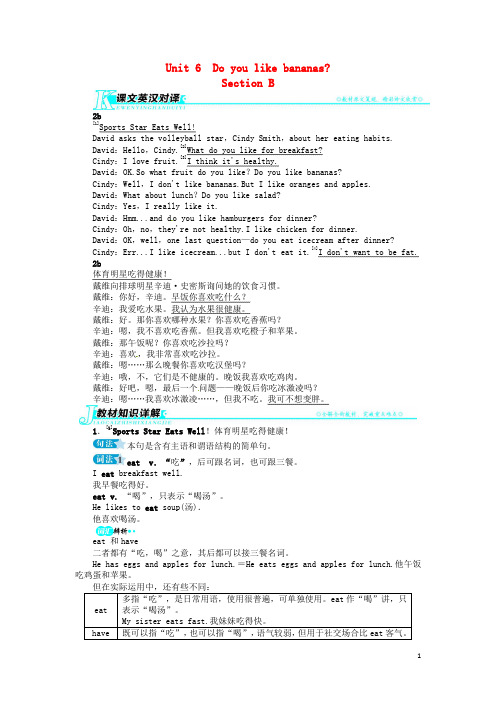
Unit 6 Do you like bananas?Section B2b[1]Sports Star Eats Well!David asks the volleyball star,Cindy Smith,about her eating habits.David:Hello,Cindy.[2]What do you like for breakfast?Cindy:I love fruit.[3]I think it's healthy.David:OK.So what fruit do you like?Do you like bananas?Cindy:Well,I don't like bananas.But I like oranges and apples.David:What about lunch?Do you like salad?Cindy:Yes,I really like it.David:Hmm...and d o you like hamburgers for dinner?Cindy:Oh,no,they're not healthy.I like chicken for dinner.David:OK,well,one last question—do you eat icecream after dinner?Cindy:Err...I like icecream...but I don't eat it.[4]I don't want to be fat.2b体育明星吃得健康!戴维向排球明星辛迪·史密斯询问她的饮食习惯。
戴维:你好,辛迪。
早饭你喜欢吃什么?辛迪:我爱吃水果。
我认为水果很健康。
戴维:好。
那你喜欢哪种水果?你喜欢吃香蕉吗?辛迪:嗯,我不喜欢吃香蕉。
但我喜欢吃橙子和苹果。
戴维:那午饭呢?你喜欢吃沙拉吗?辛迪:喜欢,我非常喜欢吃沙拉。
七年级英语(2014.6听力)
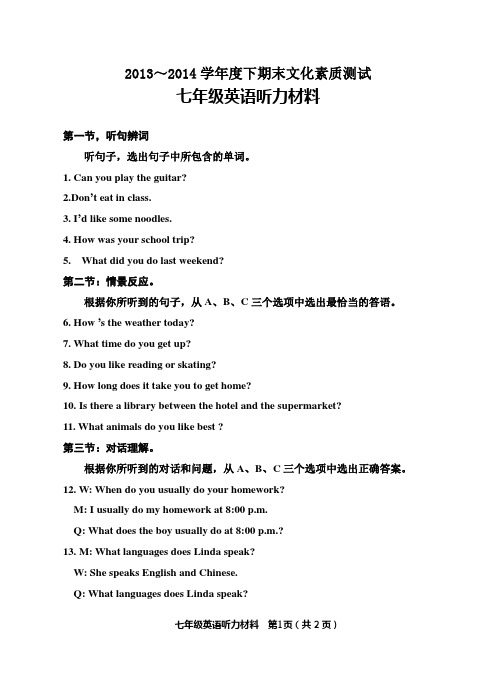
2013~2014学年度下期末文化素质测试七年级英语听力材料第一节,听句辨词听句子,选出句子中所包含的单词。
1. Can you play the guitar?2.Don’t eat in class.3. I’d like some noodles.4. How was your school trip?5. What did you do last weekend?第二节:情景反应。
根据你所听到的句子,从A、B、C三个选项中选出最恰当的答语。
6. How ’s the weather today?7. What time do you get up?8. Do you like reading or skating?9. How long does it take you to get home?10. Is there a library between the hotel and the supermarket?11. What animals do you like best ?第三节:对话理解。
根据你所听到的对话和问题,从A、B、C三个选项中选出正确答案。
12. W: When do you usually do your homework?M: I usually do my homework at 8:00 p.m.Q: What does the boy usually do at 8:00 p.m.?13. M: What languages does Linda speak?W: She speaks English and Chinese.Q: What languages does Linda speak?14. W: Do you like lions?M: Yes, because they are cute and clever.W: Where are they from?M: They are from Africa, and they like to eat meat.Q: What are they talking about?15. W: Tom, how do you usually go to the park, by bus or by bike?M:By bus.Q: How does Tom usually go to the park?16. W: What are the children doing?M: Tom is reading a book, and Ann is drawing a picture.Q: What’s Tom doing?17. W: Our English teacher’s new look is great. I like it.M: Do you say Miss Zhang?W: Yes, she doesn’t have long hair now. She has short curly hair.Q: What’s their English teacher’s new look?第四节:短文理解。
2013-2014年度初一下期末英语试卷(定稿)
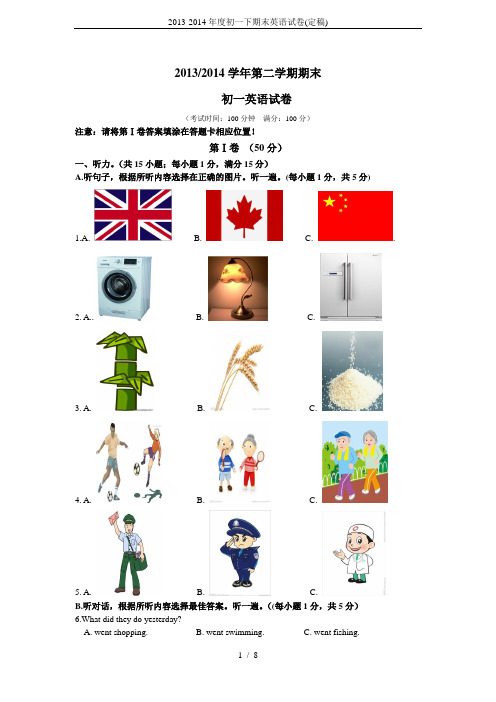
2013/2014学年第二学期期末初一英语试卷(考试时间:100分钟满分:100分)注意:请将第Ⅰ卷答案填涂在答题卡相应位置!第Ⅰ卷(50分)一、听力。
(共15小题;每小题1分,满分15分)A.听句子,根据所听内容选择在正确的图片。
听一遍。
(每小题1分,共5分)1.A. B. C. .2. A.. B. C.3. A. B. C.4. A. B. C.5. A. B. C.B.听对话,根据所听内容选择最佳答案。
听一遍。
((每小题1分,共5分)6.What did they do yesterday?A. went shopping.B. went swimming.C. went fishing.7.Where is Mike’s key?A. It’s under the desk.B. It’s on the desk.C. It’s beside Amy’s.8.Where is Kate now?A. In the living room.B. In her bedroom.C. In her study.9. What are they doing?A. They are shopping.B. They are cookingC. They are making a call.10.Where is the restaurant?A. To the north of the bank.B. To the north of the cinema.C. Next to the bank.C.听短文,根据所听内容选择最佳答案。
听两遍。
((每小题1分,共5分)11. Where does Zhang Hua live?A. In a small town in Sichuan.B. In a big town in Sichuan.C. In a small city in Sichuan.12. Why do people seldom go to the city?A. Because they don’t need to go there.B. Because they have no money.C. Because it’s too far.13. Where do people sometimes buy things?A. We don’t know.B. In the town.C. In the city.14. What food are there on the hills?A. Fruit.B. Mushrooms.C. Wheat.15. How are the people there?A. Generous.B. Beautiful.C. Selfish.二、单项选择((每小题1分,共15分)16. Her son began to play __________piano when she was only three. Now he’s very good at it .A. anB. aC. theD. /17. -We have 7 people here , but the car only has 5 seats.-I think we need to solve this __________now.A. matterB. troubleC. problemD. question18. It’s important for us to keep food __________in the fridge, especially in summer.A. freshB. deliciousC. terribleD. tasty19. Look! A large group of birds are flying __________the mountain!A. pastB. throughC. overD. across20. Mrs. Bond is a good teacher, he is also an old friend of __________.A. Anna motherB. Anna mother’sC. Anna’s motherD. Anna’s mother’s21.__________players will take part in the Youth Olympic Game this year.A. HundredB. HundredsC. Hundred ofD. Hundreds of22. That hard-working woman began to do housework as soon as she __________home.A. came toB. reachedC. arrived atD. got to23. More students start to play basketball in our school, few of them can play very__________though they always practise after school.A. hardB. goodC. wellD. better24. We need to practice speaking English every day, __________ our spoken English won’tbecome better.A. soB. andC. orD. but25. The girl__________ swim when she was only four years old. Isn’t it amazing?A. couldB. mayC. canD. must26. What __________music it is!A. amazingB. an amazingC. a amazingD. an amazed27.-Will you please look __________my pet dog during my visit to Shanghai?-Of course, I still have some dog food left here.A. atB. outC. forD. after28.-Would you like to go to the cinema with me tonight?-__________, I still have a lot of things to do.A. Never mindB. Not at allC. I’m afraid notD. No way29. I bought some CDs for my father. They __________me 60 yuan.A. costB. spendC. useD. pay30.-What else do you need?-__________else. I get everything ready now.A. EverythingB. NothingC. SomethingD. Anything三、完形填空。
(深度解析)2014年秋七年级英语上册(课文英汉对译+教材详析+新题提升)Module 6 Unit 3 Language in use
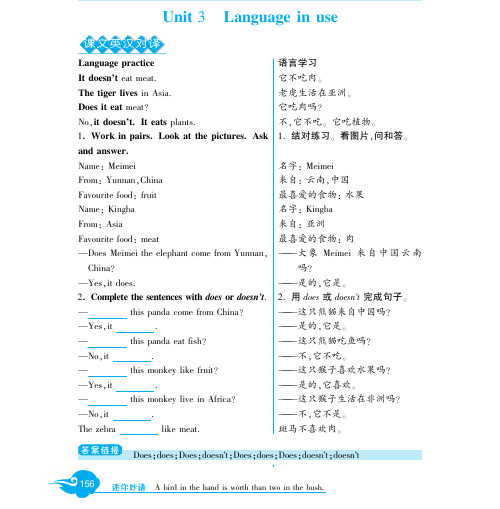
Unit3 Language inuseThe zebra Does;does;Does;doesn’t;Does;does;Does;doesn’t;doesn’t 迷你妙语 A bird in the hand is worth than two in the bush.156一日之计在于晨㊂ 迷你妙语 are;is;is;doesn’t;comes;eatsplete the word map with the words from the box. 4.用方框内的单词完成单词联想图表㊂Africa elephant monkey panda tiger zebra非洲 大象 猴子 熊猫 老虎斑马Around the world世界各地Camels骆驼 The camel lives in the desert of Africa and Asia and eats grass.Some people think it carries water in the humps on its back,but it’s not true.In fact,it’s fat. 骆驼生活在亚洲和非洲的沙漠里,而且吃草㊂有些人认为驼背上的驼峰里储藏着水,但这不是真的㊂实际上,它是脂肪㊂Kangaroos袋鼠 The kangaroo is an Australian animal.It eats grass and leaves,but it doesn’t eat meat.It carries its babies and,with its strong tail andback legs,it jumps across the grassland. 袋鼠是一种澳大利亚动物㊂它吃草和树叶,但不吃肉㊂它携带自己的孩子,用它强壮的尾巴和后腿穿越草原㊂Module task :Making a poster of your favou⁃rite animal.模块任务:制作一张你喜欢的动物的海报㊂5.Work in groups.Find out about an animal.5.分组练习㊂查明一种动物的情况㊂● Talk about your favourite animal.● 讨论你最喜爱的动物㊂● Choose one animal to write about.● 选择一种动物写一写㊂● Find out about the animal.● 查明这种动物的情况㊂It’sbig/small /tall,black and white/...It comes from Asia /Africa /...It eats meat /grass /bamboo /...它是大/小/高,黑白相间/ 它来自亚洲/非洲/ 它吃肉/草/竹子/ 迷你妙语 An hour in the morning is worth two in the evening.的海报㊂Draw it or find a photo.画一张或找一张照片㊂Write some information about it.写一些关于这种动物的信息㊂7.Present your poster to the class.7.向同学们展示你们的海报㊂一㊁词汇短语㊁句式1.It lives in the desert and eats grass.它生活在沙漠中,吃草㊂(1)desert 作名词,表示 沙漠”㊂例如:in the desert 在沙漠里(2)grass 作不可数名词,表示 草”,草场用grassland ㊂例如:Cattle eat grass.牛吃草㊂They are sitting on the grass.他们坐在草地上㊂2.in fact 实际上I think so;in fact,I am quite sure.我想如此,事实上我十分相信如此㊂In fact,learning a language is not so difficult as some people imagined.实际上,学习一种语言并不像有些人想象的那么难㊂3.It doesn’t eat meat.它不吃肉㊂这是一个一般现在时的否定句,句中有行为动词,动词用do,主语为it,用does,does not 缩写为doesn’t,后面的动词用原形㊂Lily doesn’t do her homework on Saturday.莉莉在周六不做作业㊂Mike doesn’t like drawing.迈克不喜欢画画㊂二㊁语法归纳一般现在时does 动词的句式变化(1)动词第三人称单数形式变化规则情况变化词例一般情况加⁃s likes,reads,gets 以ch,sh,s,x 结尾的词加⁃esfinishes,watches 以 辅音字母+y”结尾的词变y 为i 再加⁃escarries,cries助记歌谣 动词加⁃s 或⁃es 方法歌诀动词三单现在式,一般词尾加⁃s㊂s,x,ch,sh 在词尾,直接加上⁃es㊂词尾若是字母o,加上⁃es 不用愁㊂人类最宝贵的品质是持之以恒㊂ 迷你妙语 ⁃es 后边紧跟随,study →studies 看明白㊂(2)由does 引导的一般疑问句,其中does 是助动词,主要用于帮助构成疑问句,用于一般现在时的第三人称单数形式,回答此类问题时,若是肯定回答,用does ;若是否定回答,则用doesn’t ㊂Does Han Mei like chicken,salad for lunch?韩梅午饭喜欢吃鸡肉㊁沙拉吗? Yes,she does./No,she doesn’t.是的,她喜欢㊂/不,她不喜欢㊂(3)在否定句中,则用does not (doesn’t ),后面的第三人称单数改为原形㊂例如:I don’t like dancing.我不喜欢跳舞㊂She doesn’t like watching a football match.她不喜欢看足球赛㊂一㊁完成句子㊂1.欢迎来中国㊂ China!2.随时欢迎你来我家㊂You always in my home.3.你应该多运动,保持健康㊂You should take more exercise and .4.粉红色是我最喜欢的颜色㊂Pink is my .5.这些动物来自世界各地㊂The animals come from .二㊁阅读短文,用括号内所给词的适当形式填空㊂Lin Tao usually 1 (go)to the zoo with his parents.He likes to see 2 (animal).In his room there 3 (be)many toys.Most of them are boy animals.All kinds of animals in 4 (he)room are his good friends.Every day he plays with 5 (they). 6 (sometime)he asks his friends to his home to play.On weekends he like to see the 7 (monkey)and elephants in thezoo,and the dolphin show 8 (be)his favourite.答案全析全解:一㊁1.Welcome to 2.are;welcome 3.keep healthy 4.favourite colour 5.all around the world 二㊁1.goes 2.animals 3.are 4.his 5.them 6.Sometimes 7.monkeys 8.is1.模块短语归纳in /from the Arctic 在/来自北极 in Europe 在欧洲 in the wild 在野外 迷你妙语 The rarest of all human qualities is consistency.15kilos of...15公斤 stay healthy 保持健康live in 居住2.模块重点句型总结(1)含有助动词be 的一般现在时句子Is the kangaroo in Australia?袋鼠是澳大利亚的吗? Yes,it is.是的㊂(2)含有第三人称单数的一般现在时疑问句式 Does tiger eat meat?老虎吃肉吗? Yes,it does./No,it doesn’t.是的,它吃㊂/不,它不吃㊂ Does the polar bear eat meat?北极熊吃肉吗?(3)favourite 的用法What’s your favourite animal?你最喜爱的动物是什么? The panda is my favourite animal.熊猫是我最喜欢的动物㊂ What kind of wild animals do you like best?你最喜欢哪种野生动物?I like camels best.我最喜欢骆驼㊂3.模块写作技巧总结【写作示例】请以 My Favourite Animal”为题介绍你最喜爱的动物㊂内容包括:你最喜爱的动物的特征㊁喜好,喜欢的原因等㊂要求:词数50左右㊂My Favourite Animal【写作技巧】(1)文章要求介绍自己喜爱的动物;(2)从内容上讲,文章要求介绍最喜爱动物的形体特征和喜欢的原因,所以注意介绍要按照一定的次序,符合逻辑性㊂【范文】My Favourite AnimalMy favourite animal is cat.So I have a cat.Her name is Mimi.She lives in myhome.She is very small.She has two eyes,two ears,a nose and a mouth.My mother calls her little baby”.She is two years old.She likes to eat fish every day,but she doesn’t eat grass or leaves.She likes running and climbing.She is kind of lazy,but sheis very cute.I like playing with her after school.I like her because she makes me hap⁃py.So she is the favourite with all the family!。
2014年人教版新目标英语七年级下册Unit6课件(79页)
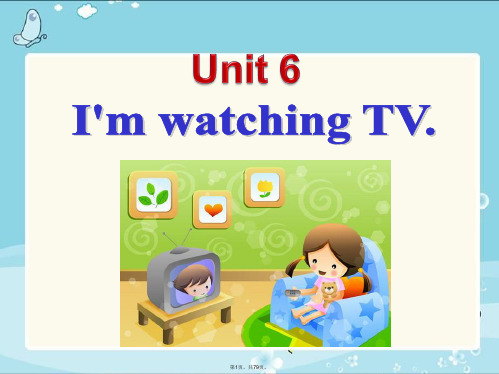
否定式: 1. I am not singing.
2. She is not dancing.
3. He is not listening. 4. They are not watching TV.
第28页,共79页。
一般疑问句: 1. Are you singing?
第39页,共79页。
1. 你好!我是李明。_H_e_l_lo_._T_h_i_s_i_s_L_i_M__i_n_g_. 你好,李明。我是杰克。
_H_i_, _L_i _M_i_n_g_._I_t’_s_J_a_c_k_h_e_r_e_. ___ 2. 你在做什么, 王芳?
_W_h__at__ar_e__yo_u__d_o_in_g_,_W__a_n_g_F__an__g?_____ 没什么。我在看报纸。
注意: 以”ie”结尾,要变“ie”为“y”, 再加-ing. 如:die—dying(死)lie—lying(平躺)。 3. 常与现在进行时态连用的词:
now, listen, look等。
如: What are you doing now? (你在干什么?) I’m reading now. (我现在正在读书) Listen! She is singing. (听, 她正在唱歌)
重读闭音节以 一个辅音字母 结尾的,双写 这一字母+ing
write take close get run swim put
第24页,共79页。
writing taking closing getting running swimming putting
Self-check 1. Add more words in the chart. Then write at least five sentences using the words
2014人教版七年级下Unit6 SectionA课件1

1b Listen. What are these people doing? Write the numbers from 1a.
1) 交际用语,用于礼貌地接受他人邀
请,还可以说成I’d like to, 但语气比 较弱。 2) 当委婉拒绝他人邀请时,多用I’d love to, but...或Sorry, I’m afraid I can't because...等。
T: What is she doing? S: She is…. S: She is…
译短语
1.看电视 2.打扫卫生 3.读报 4.通过电话交谈 5.听CD 6.用电脑 7.做汤 8.洗碗 9. 锻炼
watch TV clean read a newspaper talk on the phone listen to a CD use the computer make the soup wash the dishes exercise
They’re watching TV.
What’re they doing?
2a Listen and match the answers with the questions.
1. What is Steve a. He is watching TV. b. He is listening to a CD.
2c Role-play the conversation in 2b.
2d Read the conversation in 2d and match.
模式2:2014年秋人教版新目标英语七年级上全册精品教案(66页)

Starter Unit 1 Good morning!一、教材分析预备篇的主要内容为26个字母和最基本的英语日常用语。
教材的编写主要是帮助那些没有英语基础的学生更好地使用本套教材,同时又帮助有一点基础的学生尽快熟悉教材中的人物,激发他们的自信心,增强说英语的兴趣。
本单元的教学内容为:1. 学习Aa --- Hh八个字母。
2. 学习八个人名。
Alice, Bob, Cindy, Dale, Eric, Frank, Grace, Helen3. 学习打招呼的用语:Hello!/ Good morning!/ Good afternoon!/ Good evening!4. 学会问候熟识的朋友和应答:-- How are you?-- I’m fine, thanks. How are you?-- I’m OK二、教学重点1. 认识教材中的人物,熟悉八个名字。
2. 字母Aa --- Hh的教学。
3. 打招呼的用语:Hello! Good morning. Good afternoon. Good evening.-- How are you? -- I’m fine, thanks. How are you? -- I’m OK.4. 字母a,e在开音节和闭音节中的读音规则。
三、教学难点教材中英语人名的学习和大、小写字母的学习及书写。
四、教学步骤The First Period (1a – 1c)Teaching aims (教学目标)1. 能识别书中的八个人物。
2. 学会八个人名的读音。
2. 学会早上见面打招呼的用语。
Language points (语言点)1. 词汇:1) 名词n.:morning, Alice, Bob, Cindy, Dale, Eric, Frank, Grace, Helen2)形容词adj. :good3) 感叹词interj. :hi, hello2. 句型:Hello! Good morning!Difficulties (教学难点):1. 八个英语名字的正确发音;2. 字母A, C, G, H的正确发音Teaching steps (教学步骤)1. Warming-up (课堂热身)(1) Teacher puts a name card with an English name above and a Chinese name below on the big desk, then points to the name card and have an introduction.T: This is my name card. I have a Chinese name ... And I have an English name ... You can call me...(2) Greet the whole class and help them to say,Hello, ... ! Good morning, ...! (学生还没有英文名,就用中文名打招呼)2. Presentation (呈现新知识)Teacher shows the photos of the eight persons by playing PPT and helps students to learn to pronounce the names. Teacher says,Here are some new students. Let’s look at them and learn their names.3. Work on 1a (完成1a)(1) Teacher shows the picture on Page 1 by playing PPT. (此步骤不出现问候语)(2) Teacher points to the persons and students say their names.(3) Teacher says one of the names and students repeat it, and then write it below Boy’s nam e or Girl’s name in the book.(4) Check their answers.E.g. T: Li Lei.S: Yes.(示意学生起立回答问题)T: Is Frank a boy’s name or a girl’s name?S: A boy’s name.T: Right. You can get the English name, Frank. Sit down, please.S: Thank you.4. Presentation (呈现新知识)Teacher shows a picture with Bob, let students guess what Bob wants to say to us. The answer maybe: Hello, Helen! or Good morning, Helen!5. Work on 1b (完成1b)(1) Play the recording for the first time, Students only listen.(2) Play the recording for the second time. Students listen and repeat.(3) Play the recording for the third time. Students look, listen and repeat.Teacher: Now please open your books and turn to Page 1. You can look at the conversation in your book. Le t’s listen and repeat.6. Work on 1c (完成1c)(1)Students practice reading the conversations in the picture in pairs. Teacher moves around the classroom when students are practicing. Give them some help if they need.(2)Teacher greets the students who has just get their English names. The other students listen, watch and learn.(3)Students practice greeting each other. They can use their Chinese names if they wish. Encourage them to use their English names if they can.(4)T: Now I’ll ask some pairs to practice your own conversations. (学生小组起立进行对话表演。
七年级英语(2014.6定稿)
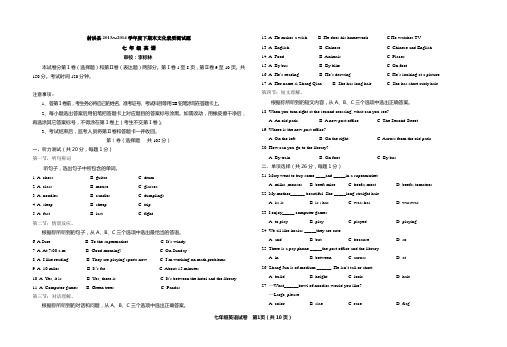
射洪县2013~2014学年度下期末文化素质测试题七年级英语审校:李标林本试卷分第Ⅰ卷(选择题)和第Ⅱ卷(表达题)两部分。
第Ⅰ卷1至8页,第Ⅱ卷9至10页。
共150分。
考试时间120分钟。
注意事项:1、答第Ⅰ卷前,考生务必将自己的姓名、准考证号、考试科目等用2B铅笔涂写在答题卡上。
2、每小题选出答案后用铅笔把答题卡上对应题目的答案标号涂黑。
如需改动,用橡皮擦干净后,再选涂其它答案标号,不得涂在第Ⅰ卷上(考生不交第Ⅰ卷)。
3、考试结束后,监考人员将第Ⅱ卷和答题卡一并收回。
第Ⅰ卷(选择题共105分)一、听力测试(共20分,每题1分)第一节,听句辨词听句子,选出句子中所包含的单词。
1. A. chess B. guitar C. drum2. A. class B. mouse C. glasses3. A. noodles B. candles C. dumplings4. A. sleep B. sheep C. trip5. A. fast B. last C. fight第二节:情景反应。
根据你所听到的句子,从A、B、C三个选项中选出最恰当的答语。
6. A.Sure. B. To the supermarket. C. It’s windy.7. A. At 7:00 a.m. B. Good morning! C. On Sunday.8. A. I like reading. B. They are playing sports now. C. I’m working on math problems.9. A. 10 miles. B. I t’s far. C. About 15 minutes.10. A. Yes, it is. B. Yes, there is. C. It’s between the hotel and the library.11. A. Computer games. B. Green trees. C. Pandas.第三节:对话理解。
2014年七年级英语(上)答案5篇范文
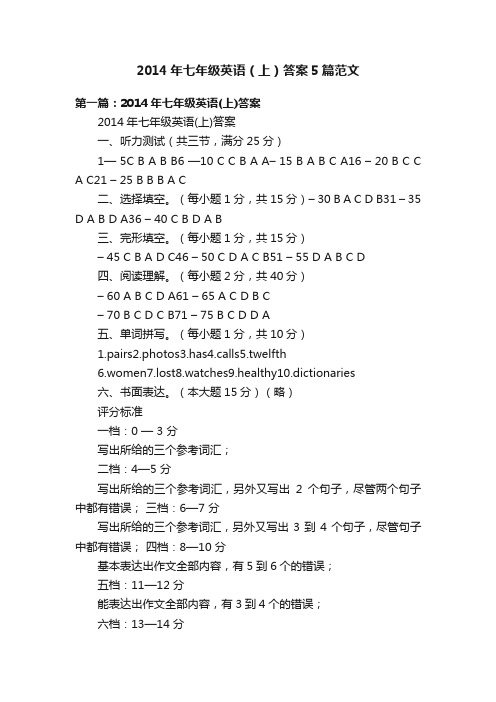
2014年七年级英语(上)答案5篇范文第一篇:2014年七年级英语(上)答案2014年七年级英语(上)答案一、听力测试(共三节,满分25分)1— 5C B A B B6 —10 C C B A A– 15 B A B C A16 – 20 B C CA C21 – 25B B B A C二、选择填空。
(每小题1分,共15分)– 30 B A C D B31 – 35D A B D A36 – 40 C B D A B三、完形填空。
(每小题1分,共15分)– 45 C B A D C46 – 50 C D A C B51 – 55 D A B C D四、阅读理解。
(每小题2分,共40分)– 60 A B C D A61 – 65 A C D B C– 70 B C D C B71 – 75 B C D D A五、单词拼写。
(每小题1分,共10分)1.pairs2.photos3.has4.calls5.twelfth6.women7.lost8.watches9.healthy10.dictionaries六、书面表达。
(本大题15分)(略)评分标准一档:0 — 3 分写出所给的三个参考词汇;二档:4—5 分写出所给的三个参考词汇,另外又写出2个句子,尽管两个句子中都有错误;三档:6—7 分写出所给的三个参考词汇,另外又写出3到4个句子,尽管句子中都有错误;四档:8—10 分基本表达出作文全部内容,有5到6个的错误;五档:11—12 分能表达出作文全部内容,有3到4个的错误;六档:13—14 分能表达出作文全部内容,有1到2个的错误;第二篇:七年级英语期末试卷答案七年级英语期末试卷答案Ⅰ1-5CBCAB 6-10CAAAB 11-15ACCBB.Ⅱ1-5CBEAD.Ⅲ1-5CBACB 6-10CAACA.Ⅳ(A篇)BBAAA(B篇)ABBBC(C篇)CBABC.ⅤA)actor;well;fifth;tired;brushes.B)Sunday;relaxing;Who;usually;speak.C)CDAEB.Ⅵ(略)八年级英语期末试卷答案Ⅰ1-5BBABC 6-10AACAB 11-15BACBB.Ⅱ1-5DBCEAⅢ1-5BCBCA 6-10ABABB.Ⅳ(A篇)FTFTF(B篇)BCABC(C篇)2 May,1975;Won a Bobby Charlton Soccer Skills award;In 1994;Scored his first international goal;Was made captain of theEngland.Ⅴ(略)ⅥA)southern;use;without;off;foreign.B)spend;wet;drive;call;University.Ⅶ(略)九年级英语期末试卷答案Ⅰ1-5BCBCA 6-10CBAAB 11-15ABCCA.Ⅱ16.was invented;17.Did,use;18.cheer,up;19.which are(由于此题只有一空易造成学生误解答案由老师自己组内讨论决定再酌情给分);20.does,doingⅢ21-25CADEB Ⅳ26-30ABCCC.31-35ACACBⅤ36-40BAACA 41-45ACBAA 46-50BACACⅥA)51-55 friendship;death;needs;helpful;standB)56-60 dreams;takes;remembered;worry;ancient Ⅶ(略)第三篇:英语七年级抽考答案七年级英语抽考试题答案一.单项填空(每小题1分,15小题共15分)1~5__CDACB______6~10__CDBAD____11~15__AAAAA_____二.完形填空(每小题1分,10小题共10分)16~20 ____ABBCB____21~25______BCABB_三.阅读理解(每小题2分,15小题共30分)26~30___DCBAB______31~35__DCCCD_____36~40_____CABB A___四.填空,每空一词(每小题1分,5小题共5分)41__Fine_____42___me_____43____Is__44_____bag__45____Thank___五.句型转换(每空1分,共10分)46.___Don’t____take______47____can’t__ ___draw_______Don’t______look____49__Can_____ ___you____50___Are___ _____you____六.从B 栏中找出A栏问句的正确答案(每小题2分,共10分)51__A__52_E__53__B___54___C____ 55___D__七.从方框中选择合适的单词并用正确的形式完成(每小题2分,共10分)56___can__57__likes___58__want__59_join___60__do____ 八.翻译句子(每小题2分,共10分)61____你为什么喜欢熊猫?______________________________62___你怎么去学校的?_______________________________63_____你们的朋友坐公交车去上学的吗?64____不要在课堂上吃东西。
2014新人教版七年级英语上Unit6完整课件

复数: strawberries
9
2021/10/10
pear [peə(r)]
可数名词 n.梨
复数: pears
10
2021/10/10
milk [mɪlk] 不可数名词
n.牛奶
11
2021/10/10
bread [bred] 不可数名词
n.面包
12
1a Match the words with the things in the picture.
2021/10/10
1
1a Match the words with the things in the picture.
1. hamburgers __d__
2. tomatoes ____
3. oranges ____
4. ice-cream ____
5. salad
____
6. bananas ____
/No, she doesn’t. She doesn’t like …
Do a report:
Hello, everyone! I like …, … and … But I don’t
like …, …or … Lucy likes …, … and … But she
doesn’t like …, … or …
milk, bread, rice
2021/10/10
Countable and uncountable nouns
food, fruit, ice-cream, salad, chicken
23
3a
Underline the correct words in the brackets.在括号内正确的单词下画线.
七年级英语(定稿2014.12)
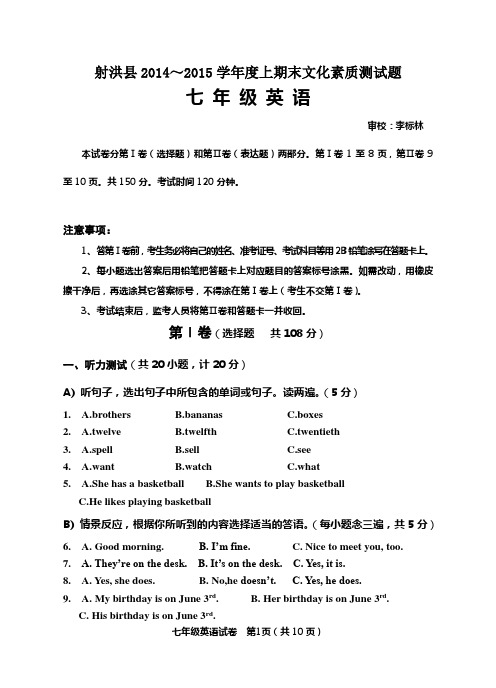
射洪县2014~2015学年度上期末文化素质测试题七年级英语审校:李标林本试卷分第Ⅰ卷(选择题)和第Ⅱ卷(表达题)两部分。
第Ⅰ卷1至8页,第Ⅱ卷9至10页。
共150分。
考试时间120分钟。
注意事项:1、答第Ⅰ卷前,考生务必将自己的姓名、准考证号、考试科目等用2B铅笔涂写在答题卡上。
2、每小题选出答案后用铅笔把答题卡上对应题目的答案标号涂黑。
如需改动,用橡皮擦干净后,再选涂其它答案标号,不得涂在第Ⅰ卷上(考生不交第Ⅰ卷)。
3、考试结束后,监考人员将第Ⅱ卷和答题卡一并收回。
第Ⅰ卷(选择题共108分)一、听力测试(共20小题,计20分)A) 听句子,选出句子中所包含的单词或句子。
读两遍。
(5分)1. A.brothers B.bananas C.boxes2. A.twelve B.twelfth C.twentieth3. A.spell B.sell C.see4. A.want B.watch C.what5. A.She has a basketball B.She wants to play basketballC.He likes playing basketballB) 情景反应,根据你所听到的内容选择适当的答语。
(每小题念三遍,共5分)6. A. Good morning. B. I’m fine. C. Nice to meet you, too.7. A. They’re on the desk. B. It’s on the desk. C. Yes, it is.8. A. Yes, she does. B. No,he doesn’t. C. Yes, he does.9. A. My birthday is on June 3rd. B. Her birthday is on June 3rd.C. His birthday is on June 3rd.10. A. They’re 5 dollars. B. It’s 5dollars. C. They’re 5 dollar.C) 听对话,根据对话内容选择正确的答案。
2014年秋新目标英语七下Unit 6 I'm watching TV P4
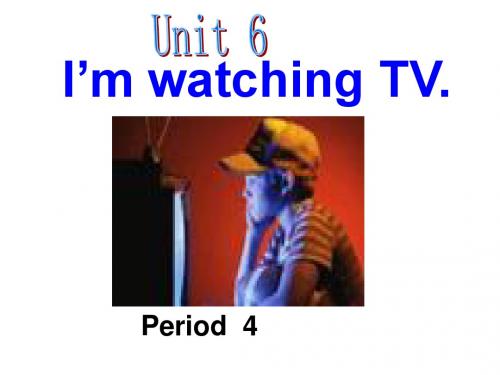
_______________________. He’s swimming in the pool
What’s she doing? She’s reading ______________. reading ______ Where ___she________? is ________________________. She’s reading in the library
pool
shop
supermarket bus stop
park
What’s she doing? She’s shopping. Where is she shopping? She’s shopping in the supermarket.
What’s he doing? He’s swimming ________________. Where _______is he swimming?
Names
Alice Mike
Places
supermarket at school
Activities
shopping
playing basketball reading
Lisa
at the library
Conversation 1 A: Hello, is Alice there? B: No, she isn’t. She’s at the supermarket . A: Oh, is she shopping? B: Yes, she is. She’s buying milk and bread . Conversation 2 A: Hello, is Mike there ? B: Sorry. He’s still(还) at school . A: Oh, um, is he doing his homework ? B: No, he isn’t. He’s playing basketball .
- 1、下载文档前请自行甄别文档内容的完整性,平台不提供额外的编辑、内容补充、找答案等附加服务。
- 2、"仅部分预览"的文档,不可在线预览部分如存在完整性等问题,可反馈申请退款(可完整预览的文档不适用该条件!)。
- 3、如文档侵犯您的权益,请联系客服反馈,我们会尽快为您处理(人工客服工作时间:9:00-18:30)。
射洪县2013~2014学年度下期末文化素质测试题七年级英语审校:李标林本试卷分第Ⅰ卷(选择题)和第Ⅱ卷(表达题)两部分。
第Ⅰ卷1至8页,第Ⅱ卷9至10页。
共150分。
考试时间120分钟。
注意事项:1、答第Ⅰ卷前,考生务必将自己的姓名、准考证号、考试科目等用2B铅笔涂写在答题卡上。
2、每小题选出答案后用铅笔把答题卡上对应题目的答案标号涂黑。
如需改动,用橡皮擦干净后,再选涂其它答案标号,不得涂在第Ⅰ卷上(考生不交第Ⅰ卷)。
3、考试结束后,监考人员将第Ⅱ卷和答题卡一并收回。
第Ⅰ卷(选择题共105分)一、听力测试(共20分,每题1分)第一节,听句辨词听句子,选出句子中所包含的单词。
1. A. chess B. guitar C. drum2. A. class B. mouse C. glasses3. A. noodles B. candles C. dumplings4. A. sleep B. sheep C. trip5. A. fast B. last C. fight第二节:情景反应。
根据你所听到的句子,从A、B、C三个选项中选出最恰当的答语。
6. A.Sure. B. To the supermarket. C. It’s windy.7. A. At 7:00 a.m. B. Good morning! C. On Sunday.8. A. I like reading. B. They are playing sports now. C. I’m working on math problems.9. A. 10 miles. B. I t’s far. C. About 15 minutes.10. A. Yes, it is. B. Yes, there is. C. It’s between the hotel and the library.11. A. Computer games. B. Green trees. C. Pandas.第三节:对话理解。
根据你所听到的对话和问题,从A、B、C三个选项中选出正确答案。
12. A. He makes a wish. B. He does his homework. C.He watches TV.13. A. English. B. Chinese. C. Chinese and English.14. A. Food. B. Animals. C. Places.15. A. By bus. B. By bike. C. On foot.16. A. He’s reading. B. He’s drawing. C. He’s looking at a picture.17. A. Her name si Zhang Qian. B. She has long hair. C. She has short curly hair. 第四节:短文理解。
根据你所听到的短文内容,从A、B、C三个选项中选出正确答案。
18. When you turn right at the second crossing, what can you see?A. An old park.B. A new post office.C. The Second Street..19. Where is the new post office?A. On the left.B. On the right.C. Across from the old park.20. How can you go to the library?A. By train.B. On foot.C. By bus.二.单项选择(共26分,每题1分)21. Mary went to buy some ____and _____in a supermarket.A. milks ,mousesB. beef; miceC. beefs; meatD. beefs; tomatoes22. My mother______ beautiful. She _____long straight hair.A. is; isB. is ; hasC. was; hasD. was;was23. I enjoy_____ computer games.A. to playB. playC. playedD. playing24. We all like koalas _____they are cute.A. andB. butC. becauseD. so25. There is a pay phone _____the post office and the library.A. inB. betweenC. acrossD. at26. Zhang Jun is of medium ______. He isn’t tall or short.A. buildB. heightC. lookD. hair27 —What______bowl of noodles would you like?—Large, please.A. colorB. sizeC. raceD. flag28. —Don’t ______late for class next time.—Sorry, Mr Wang.A. arriveB. arrivesC. arrivingD. arrive at29. My mother was _____ yesterday, because I ______all the rooms.A. happy; cleanB. sad; cleanC. tired; cleanedD. happy; cleaned30. —Can you watch TV this weekend?—______. I must study for the English test.A. Yes, I canB. Yes, I doC. No, I can’tD. No, I don’t31. —Is your friend from Canada ______ Australia?—He is from Australia.A. andB. ofC. orD. about32. —Where is Bob?—He _____ soccer in the park.A. playsB. is playingC. playD. to play33. —__________?—Yes. I’d like some oranges.A. Would you like some applesB. Can I help youC. What would you likeD. Can you help me34. He didn’t _____his homework last night. He _______specials.A. do; ateB. did; eatC. do; eatD. did; ate35. —How is the weather?—_______,so we can’t go out to play.A. It’s sunnyB. Very goodC. I t’s rainingD. I t’s warm36. —_______does your brother look like?—He is handsome.A. HowB. WhatC. WhenD. Where37. —What ______your parents _______?—They like butterflies.A. does; would likeB. would; likesC. does; likeD. do; like 38. The criminal often wears ______ . So each farmer ______ her.A. glass; knowB. glasses; knowsC. glasses; knowD. glass;knows39. —Did you have a good time last weekend?—Yes, I did. I really ______it.A. exercisedB. describedC. enjoyedD. practiced40. Betty often_____in her room. Listen! She ______.A. dances; is danceingB. dances; is dancingC. dance; dancingD. dances; dancing41. —Nice to meet you, Mike. ______?—Not bad. Thanks.A. What are you doingB. What is it doingC. Where are you goingD. How is it going42. She didn’t say _____ 2 years ago.A. anythingB. some thingsC. somethingD. somethings 43—How is the Chinese food?—Oh, it is ______. I love it.A. expensiveB. terribleC. deliciousD. noisy44. Jack likes his new home. All of the _____ are very ________.A.man; friendlyB. mans; unfriendlyC. men; unfriendlyD.men; friendly45. —How was your summer camp?—It was ______. I ______many interesting photos.A. sunny; takeB. excellent ; takedC. not bad; tookD. terrible; took46. There _____ some mutton and many magazines in the bag.A. areB. haveC. hasD. is三、补全对话。
从下方框中选出句子补全对话,使之通顺。
(共4分,每题1分)John: Hi, my name’s John. It’s my first day at school.Alice: 47 . This is a great school, but there are a lot of rules.John: Really? 48 ?Alice: well, don’t be late for class. This is very important.John: Ok, so we must be on time.Can we bring music player to school?Alice: 49 . And we always have to wear the school uniform.John: 50 .Alice: Oh, and we also have to be quiet in the library.四、完形填空(共15分,每题1分)AHi, I’m Tony. I don’t like to get up early. 51 I get up at eight. Then I go to school at eight thirty. I don’t have much time for breakfast, so I usually eat very 52 . For lunch, I usually eat hamburgers. After school, I sometimes play basketball 53 half an hour. When I get home, I always do my homework first. In the evening, I either watch TV 54 play computer games. At ten thirty, I brush my teeth and then 55 .51. A. In the morning B. In the afternoon C. In the evening D. At night52. A. differently B. quickly C. usually D. luckily53. A. at B. in C. of D. for54. A. and B. but C. or D. in55. A. go to school B. go to work C. go to bed D. go to stationBToday is Sunday. My parents and I go to a new park in my city. We 56 the park at 8:10 am. There are many 57 with flowers. They are very beautiful gardens . And there are many places 58 boys and girls to play, too. We 59 many photos in the park. Please look at this photo, I 60 volleyball with my parents. Many people are watching 61 . So we are all very excited. But after that we are very 62 . And in the second photo, we are shopping in a store in the park. We buy some hamburgers and fruit. Look! I am 63 a hamburger. My father 64 after my mother and me. Is it funny? In the third photo, we are 65 at the pool. My father is teaching me how to swim. I like swimming very much. I have a happy day.56. A. get to B. pass C. live in D. clean57. A. houses B. gardens C. malls D. libraries58. A. for B. to C. at D. of59. A. sell B. see C. take D. bring60. A. am visiting B. buying C. am having D. am playing61. A. me B. them C. us D. her62. A. funny B. tired C. cold D. scary63. A. eating B. selling C. giving D. playing64. A. shops B. is shopping C. paints D. painting65. A. walking B. running C. swimming D. sleeping五、阅读理解(共40分,每题2分)AToday we didn’t have any classes because there was an important meeting(会议) in our school. So we went to the zoo to finish our science project(项目).We left for the zoo by bus at 8:30. An hour later we arrived at the zoo. We all wanted to see the dragon show at 9:40, but we had to watch the elephants, because they were part of our project.We watched the elephants for 55 minutes. Then we had a drink and walked around the zoo to see many other animals before lunch at 11:30. Lunch was fun because we had it with some cats. We spent two hours doing what we wanted to do before we went back to the bus. At about 3:30 pm, we got back to school.66. Today there was a(n) ______ in the school.A. science reportB. important meetingC. important showD. science project67. The students went to the zoo ________.A. by busB. by trainC. by boatD. by subway68. The students got to the zoo at _________.A. 8:30B. 9:30C. 11:30D. 15:3069. The students first _______ when they got to the zoo.A. watched the dragon showB. watched the monkeysC. had a drinkD. watched the elephants70. The students had lunch with some ________.A. familiesB. tigersC. catsD. cowsA. What are some of the rules?B. I see.C. Hi, John. I’m Alice.D. No, we can’t.B71. _______ go to school by bike.A. Jack and JudyB. Jack and JimC. Vicky and LindaD. Linda and Jim72. What does Vicky do in her free time?A. She plays the piano, meets friends, goes shopping and listens to music.B. She draws, listens to music, watches TV and chats on the Net.C. She plays football, goes swimming and watches TV.D. She plays basketball, plays the guitar, dances and goes shopping.73. How does Jim go to school?A. By bike.B. By bus.C. By car.D. On foot.74. If Jack wants to go swimming, he can go with_______ .A. VickyB. LindaC. JudyD. Jim75. _______like to listen to music in their free time.A. Jack and JimB. Linda, Judy and JimC. Vicky and JudyD. Judy, Linda and JackCWho can help me? I’m very sad. I can’t find my son. H e’s only five years old. His name is Bob. He has a round face, two big brown eyes and a small nose. His hair is short, straight and yellow. He is of medium build. He is 105 cm tall. He wears a red T-shirt and blue jeans. He likes little animals. There is a toy(玩具) in his hands(手).Please help me. If you see him, please call me. My phone number is 563-9480. My name is Mary Smith. Thank you very much.76. What’s the boy’s name?A. Jack.B. Bob.C. Peter.D. Eric.77. How old is Mary’s son?A. Three years old.B. Four years old.C. Five years old.D. Six years old.78. The boy has ______.A. a round faceB. two big black eyesC. a big noseD. long yellow hair79. What color are the boy’s clothes?A. His T-shirt is black and his jeans are blue.B. His T-shirt is red and his jeans are brown.C. His T-shirt is yellow and his jeans are black.D. His T-shirt is red and his jeans are blue.80. What’s in the boy’s hands?A. A book.B. A pen.C. A toy.D. An orange.DToday is Monday. My friends are talking about how they spent the last weekend.Mary: I stayed at home and studied at the weekend. I studied for the math test on Saturday. Yesterday, I did my English homework. In the evening, I talked to my friend on the phone. What did you do?Lucy: I had a great time. I visited my friends. On Saturday night, we went to Nancy’s birthday party. On Sunday afternoon, we went to a new park near my home.Lily: Oh, your weekend was great! But I had a boring weekend. I stayed at home. I cleaned my room. I helped my mom cook dinner. Tim, did you go out?Tim: No, I didn’t. I stayed at home and watched TV. Yesterday I saw a movie. It was very interesting.81. Who cleaned the room last weekend?A. Mary.B. Lucy.C. LilyD. Tim82. Who went to a party?A. Mary.B. Lucy.C. Lily.D. Tim.83. What did Mary do on Sunday evening?A. She talked to her friend on the phone.B. She watched TV at home.C. She went to a park.D. She cooked dinner.84. Who went out for fun?A. Mary.B. Lucy.C. Lily.D. Tim.85. What didn’t Tim do?A. He stayed at homeB. He watched TV at home.C. He saw a movie.D. He studied for the test.How do you usually go to school? What do you usually do in your free time?Jack I often go to school by bike, but sometimes Iwalk to school.Play football, go swimming and watch TV.Linda I always go to school by subway.It’s very quick. Play the piano, meet friend, go shopping and listen to music.Vicky I sometimes take the subway, and sometimes take a bus to school. Play basketball, play the guitar, dance and go shopping.Judy I ride my bike to school every day. Draw, listen to music, watch TV and talk on the net.Jim I never walk to school or take a bus.My father drives me to school every day. Play computer games, listen to music, read, go swimming and play soccer.射洪县2013~2014学年度下期末文化素质测试题七年级英语第Ⅱ卷(表达题共45分)题号六七八九总分总分人复查人得分注意事项:1、第二卷共2页,用蓝色或黑色墨水钢笔直接答在试卷上。
